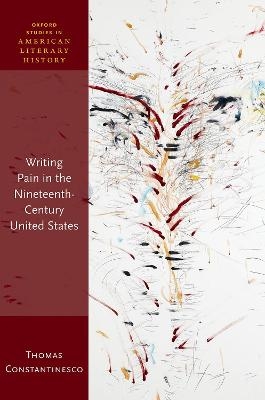
Writing Pain in the Nineteenth-Century United States
Seiten
2022
Oxford University Press (Verlag)
978-0-19-285559-6 (ISBN)
Oxford University Press (Verlag)
978-0-19-285559-6 (ISBN)
This book examines how pain is represented in a range of literary texts and genres from the nineteenth-century United States. It considers the aesthetic, philosophical, and ethical implications of pain as the national culture of pain progressively transformed in the wake of the invention of anesthesia.
Writing Pain in the Nineteenth-Century United States examines how pain is represented in a range of literary texts and genres from the nineteenth-century US. It considers the aesthetic, philosophical, and ethical implications of pain across the works of Ralph Waldo Emerson, Harriet Jacobs, Emily Dickinson, Henry James, Elizabeth Stuart Phelps, and Alice James, as the national culture of pain progressively transformed in the wake of the invention of anesthesia.
Through examining the work of nineteenth-century writers, Constantinesco argues that pain, while undeniably destructive, also generates language and identities, and demonstrates how literature participates in theorizing the problems of mind and body that undergird the deep chasms of selfhood, sociality, gender, and race of a formative period in American history. Writing Pain in the Nineteenth-Century United States considers first Emerson's philosophy of compensation, which promises to convert pain into gain. It also explores the limitations of this model, showing how Jacobs contests the division of body and mind that underwrites it and how Dickinson challenges its alleged universalism by foregrounding the unshareability of pain as a paradoxical measure of togetherness. It then investigates the concurrent economies of affects in which pain was implicated during and after the Civil War and argues, through the example of James and Phelps, for queer sociality as a response to the heteronormative violence of sentimentalism. The last chapter on Alice James extends the critique of sentimental sympathy while returning to the book's premise that pain is generative and the site of thought. By linking literary formalism with individual and social formation, Writing Pain in the Nineteenth-Century United States eventually claims close reading as a method to recover the theoretical work of literature.
Writing Pain in the Nineteenth-Century United States examines how pain is represented in a range of literary texts and genres from the nineteenth-century US. It considers the aesthetic, philosophical, and ethical implications of pain across the works of Ralph Waldo Emerson, Harriet Jacobs, Emily Dickinson, Henry James, Elizabeth Stuart Phelps, and Alice James, as the national culture of pain progressively transformed in the wake of the invention of anesthesia.
Through examining the work of nineteenth-century writers, Constantinesco argues that pain, while undeniably destructive, also generates language and identities, and demonstrates how literature participates in theorizing the problems of mind and body that undergird the deep chasms of selfhood, sociality, gender, and race of a formative period in American history. Writing Pain in the Nineteenth-Century United States considers first Emerson's philosophy of compensation, which promises to convert pain into gain. It also explores the limitations of this model, showing how Jacobs contests the division of body and mind that underwrites it and how Dickinson challenges its alleged universalism by foregrounding the unshareability of pain as a paradoxical measure of togetherness. It then investigates the concurrent economies of affects in which pain was implicated during and after the Civil War and argues, through the example of James and Phelps, for queer sociality as a response to the heteronormative violence of sentimentalism. The last chapter on Alice James extends the critique of sentimental sympathy while returning to the book's premise that pain is generative and the site of thought. By linking literary formalism with individual and social formation, Writing Pain in the Nineteenth-Century United States eventually claims close reading as a method to recover the theoretical work of literature.
Thomas Constantinesco is Professor of American Literature at Sorbonne Université, France. He also taught at Yale, Oxford, and Université de Paris. Between 2014 and 2019, he was a Junior Fellow at the Institut Universitaire de France and, in 2019-2021, a Marie Sklodowska-Curie Fellow at Oxford. He is the author of Ralph Waldo Emerson: L'Amérique à l'essai (Éditions Rue d'Ulm, 2012). He has published essays on nineteenth-century American literature in such venues as The New England Quarterly, ESQ: A Journal of the American Renaissance, American Periodicals, and Textual Practice. With Sophie Laniel-Musitelli, he co-edited Romanticism and Philosophy: Thinking with Literature (Routledge, 2015).
| Erscheinungsdatum | 19.05.2022 |
|---|---|
| Reihe/Serie | Oxford Studies in American Literary History |
| Verlagsort | Oxford |
| Sprache | englisch |
| Maße | 164 x 240 mm |
| Gewicht | 558 g |
| Themenwelt | Geschichte ► Allgemeine Geschichte ► Neuzeit (bis 1918) |
| Geisteswissenschaften ► Sprach- / Literaturwissenschaft ► Anglistik / Amerikanistik | |
| Geisteswissenschaften ► Sprach- / Literaturwissenschaft ► Literaturgeschichte | |
| Geisteswissenschaften ► Sprach- / Literaturwissenschaft ► Literaturwissenschaft | |
| ISBN-10 | 0-19-285559-X / 019285559X |
| ISBN-13 | 978-0-19-285559-6 / 9780192855596 |
| Zustand | Neuware |
| Haben Sie eine Frage zum Produkt? |
Mehr entdecken
aus dem Bereich
aus dem Bereich
Europa 1848/49 und der Kampf für eine neue Welt
Buch | Hardcover (2023)
DVA (Verlag)
48,00 €
Giordano Bruno - ein ketzerisches Leben
Buch | Hardcover (2024)
C.H.Beck (Verlag)
29,90 €


